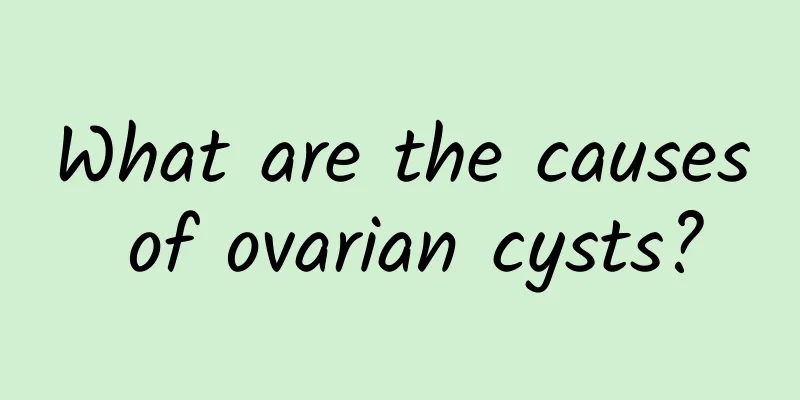What are the causes of miscarriage?

|
Many female friends have had the sad experience of miscarriage. There are many causes of miscarriage, including genetic factors and miscarriage caused by one's own negligence. It is necessary for everyone to understand the causes of miscarriage. Everyone should take precautions in life to avoid regrets. Let us analyze the causes of miscarriage from five aspects. The main causes of miscarriage in women are: 1. Maternal factors 1. Reproductive organ diseases: Uterine malformations (such as double uterus, uterus septate and uterine hypoplasia) and pelvic tumors (such as uterine fibroids) can affect the growth and development of the fetus and lead to miscarriage. Relaxation of the internal cervix or severe cervical lacerations can easily lead to late miscarriage due to premature rupture of membranes. 2. Endocrine disorders: Hypothyroidism, uncontrolled severe diabetes, and luteal insufficiency can all lead to miscarriage. 3. Systemic diseases: Acute diseases and high fever during pregnancy can cause uterine contractions and lead to miscarriage; bacterial toxins or viruses (herpes simplex virus, cytomegalovirus, etc.) enter the fetal blood circulation through the placenta, causing fetal death and miscarriage. In addition, severe anemia or heart failure in pregnant women can cause fetal hypoxia and may also cause miscarriage. If pregnant women suffer from chronic nephritis or hypertension, the placenta may infarct and cause miscarriage. 4. Trauma: Abdominal surgery during pregnancy, especially in the early stages of pregnancy, or trauma during mid-pregnancy can cause uterine contractions and lead to miscarriage. 2. Environmental factors There are many adverse external factors that affect reproductive function, which can directly or indirectly cause damage to the embryo or fetus. Excessive exposure to certain harmful chemicals (such as arsenic, lead, benzene, formaldehyde, chloroprene, ethylene oxide, etc.) and physical factors (such as radiation, noise and high temperature, etc.) can cause miscarriage. 3. Genetic factors In early spontaneous abortion, 50% to 60% of embryos have chromosomal abnormalities, most of which are abnormalities in chromosome number, followed by abnormal chromosome structure. Abnormalities in number include trisomy, triploidy and X monomer, etc.; structural abnormalities include chromosome breakage, inversion, deletion and translocation. Most embryos with chromosomal abnormalities end in miscarriage. A very small number may continue to develop into a fetus, but some functional abnormalities or combined deformities may occur after birth. If a miscarriage has occurred, the product of pregnancy is sometimes only an empty gestational sac or a degenerated embryo. IV. Immune factors Pregnancy is like allogeneic transplantation. There is a complex and special immunological relationship between the embryo and the mother, which prevents the embryo from being rejected. If the mother and the fetus are not immune compatible, the mother may reject the embryo and cause miscarriage. The relevant immune factors mainly include the father's tissue compatibility antigens, fetal specific antigens, blood type antigens, maternal cellular immune regulation disorders, etc. 5. Insufficient placental endocrine function In early pregnancy, in addition to the corpus luteum of the ovary secreting progesterone, the placental trophoblast cells also gradually produce progesterone. After 8 weeks of pregnancy, the placenta gradually becomes the main site for the production of progesterone. In addition to progesterone, the placenta also synthesizes other hormones such as β-chorionic gonadotropin, placental lactogen and estrogen. In early pregnancy, the above hormone values decrease, and it is difficult for the pregnancy to continue, resulting in miscarriage. The main causes of miscarriage in women have been introduced to you now. Pregnant women must have regular checkups during pregnancy to avoid miscarriage caused by the above factors. I hope the above content can help you and wish female friends a smooth delivery. |
<<: Causes of recurrent miscarriage
>>: What are the causes of miscarriage in women?
Recommend
What treatments would you choose for irregular menstruation?
What are the treatments for irregular menstruatio...
My period came on November 5th but didn't come on December 5th
If your period that started on November 5th has n...
What are the hazards of having sex after abortion? Five aspects of nursing care should be done after abortion
Many young people do not pay attention to their p...
Where can I cure pelvic peritonitis?
"How to choose a hospital to treat pelvic pe...
What causes thick endometrium?
Endometrial thickening may be related to an unhea...
What are the main causes of cervical hypertrophy?
Regarding the causes of cervical hypertrophy, man...
How can we fight against bacterial vaginosis?
Bacterial vaginosis is very destructive to women&...
Reference standard for diagnosis of threatened abortion
What are the diagnostic reference standards for t...
How can cervical erosion be identified? Does cervical erosion require medication?
How can cervical erosion be identified? Do I need...
Doctors do not recommend taking amoxicillin for ordinary abortions. Under what circumstances can you take amoxicillin after an abortion?
If it is a normal abortion and there is no infect...
Introduction to the causes of uterine fibroids
With the increasing number of patients with uteri...
What are the factors causing vaginal candidiasis?
Vaginal candidiasis is the most common gynecologi...
What are the clinical manifestations of cervicitis in women? Three clinical manifestations of cervicitis in women
Female friends should all know that the cervix is...
Can thin uterine wall cause premature ovarian failure?
Thin uterine wall does not directly cause prematu...
Why do ovarian cysts appear
Ovarian cysts may be caused by dietary factors, e...









